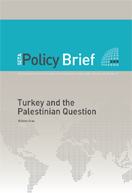In the parliamentary elections of July 22, 2007, AKP (Justice and Development Party) won 47% of the votes, obtaining a very strong mandate to take issue with Turkey’s outstanding problems. In the predominantly Kurdish east and southeast region, the AKP doubled its vote from 26% to 53%. The AKP seemed to have persuaded the Kurds thanks to the party’s earlier moves to solve the Kurdish problem by granting more rights and freedoms as well as jobs and economic prosperity. Having started the negotiation process with the EU and obtaining such a strong mandate from the Kurdish voters, why did the AKP turn its back to the Kurdish issue? This can be explained with reference to three groups of factors working at the domestic, the EU and international levels.
In the parliamentary elections of July 22, 2007, the Justice and Development Party (AKP) increased its votes from 34% in 2002 to 47%, obtaining a very strong mandate to take issue with Turkey’s outstanding problems. In the predominantly Kurdish southeast region, the AKP doubled its vote from around 26% to approximately 53%. The AKP seemed to have persuaded the Kurds to come aboard, thanks to the party’s earlier moves indicating a willingness to solve the Kurdish problem by granting more rights and freedoms, as well as jobs and economic prosperity to the Kurds. The vote share of the AKP surpassed that of the Democratic Society Party (DTP) in many parts of the region, suggesting that improvements in human rights and democracy during the first AKP government may have stripped Kurdish nationalism of its popular support. Moreover, the AKP government departed from previous attitudes by repeatedly emphasizing the Kurds’ right to express their culture and identity. Marking a significant turning point in 2005, Erdoğan became the first prime minister to acknowledge that ‘the [Turkish] state has made mistakes about the Kurdish issue’. The courage to make this admission came at least to some extent from the EU’s legal and normative framework. This is not to claim that the opening up of the Kurdish issue can only be attributed to such external factors as the EU process. Erdoğan’s personal history of fighting for more religious freedom (and his subsequent imprisonment under the Article 312 of the Turkish criminal code for reading a few lines from a poem) may have caused him to challenge the status quo not only in matters of religion/secularism but also those of ethnicity. Nevertheless, the normalization of the state and, with it, the mainstream discourses in regard to the Kurdish issue would not have been possible without the external legitimization provided by the EU. During the Helsinki Summit of 1999, Turkey’s candidacy was approved by the European Union. With this decision, Turkey’s membership became more likely than ever. In light of this event, Turkish governments, especially since 2001, have pursued an unprecedent process of domestic political reform. A second trigger for the reforms has undoubdtly been the capture of the PKK (Kurdish Workers Party) leader Abdullah Öcalan in 1999. Following Öcalan’s capture, the PKK announced a ceasefire followed by a sudden halt in PKK terror. The removal of the immediate threat of terror opened new spaces for debating the Kurdish issue without necessarily framing it as a security issue. Moreover, Öcalan’s capture broke the hopes of those who supported the PKK’s methods and left them with only democratic means to voice their demands. Moderate Kurdish groups became one of the biggest supporters of the EU membership process in the hope that the process would bring more democratization and guarantees of human rights. As part of the EU integration process, the right of education and broadcasting in a mother tongue was granted in 2002. Previously, the granting of this basic right to the Kurdish minority had not been c









